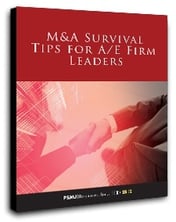
Market conditions are getting stronger, backlog is growing, and – for many architecture and engineering firms – revenue levels are climbing nicely. With this as a backdrop, many of those Baby Boomer firm owners who put exit or retirement plans on hold during the recession are now thinking this is a good time to re-start succession plans. Unfortunately, we’re seeing a fairly intriguing problem popping up a lot lately.
Here’s the problem!
We are seeing more and more A/E firms with a valuation formula tied heavily to revenue. On the surface, this makes sense. Revenue is relatively easy to track and difficult to manipulate – two elements that are key for any viable valuation formula. But, as we all know, growth sucks up cash. Just because a firm is in revenue growth mode, that doesn’t mean that free cash flow is climbing at a corresponding rate. You can start to see the issue here. Theoretical value (based on a flawed formula) is deviating from realizable value (what the firm can really support).
In one particular firm (let’s call it Axis Engineering), a strategic emphasis on global business development after the recession has paid off handsomely. Axis has doubled in size to over 400 people and revenues have more than doubled to over $60M. However, the company’s internal ownership transition has nearly ground to a halt over the last few years. The valuation formula in Axis’ Buy/Sell Agreement has four main components:
-
Pre-Tax Profit
-
Book Value
-
Gross Revenue
-
Backlog
By using a mix of these values, Axis, when it was smaller, had done a very good job at keeping share price volatility to a minimum. But, as this firm has grown aggressively in the last three years, the formula has started to break. Of course, the existing shareholders have been thrilled to see the stock value grow. However, this value is “trapped” in the firm if there are no buyers, and the firm isn’t generating the cash needed to redeem the shares looking to be sold. In fact, Axis has actually had three consecutive years of negative cash flow because free cash flow has failed to keep up with growth, and no bonuses to young leaders means no stock purchases.
The Axis ownership team looked to PSMJ’s valuation and transition planning experts to figure out a solution that will keep their ownership program moving forward.
Here’s the solution
After assessing Axis’ financial performance, equity redemption liabilities, and the behavior of its valuation formula, we provided the following recommendations:
-
A new valuation formula. This formula is set up to be more sustainable and less volatile. It is based more heavily on a multi-year average of pre-tax cash flow as well as book value. It also retains a smaller weighting on revenue to help manage volatility.
-
Managed implementation. The new valuation formula is being implemented over a three-year period to reduce the “shock” factor to near-term sellers and prevent buyers from attempting to “time” the market.
-
Ongoing monitoring. It is very dangerous for any firm to adopt any valuation formula as part of a Buy/Sell Agreement and then ignore it for years as the firm grows. There seems to be an attitude in many firms that because there is a legal agreement between the firm and its shareholders, and the valuation is part of that agreement, it is carved in stone and must not be changed. The truth is that market conditions, firm dynamics, and a host of other factors change over time. The valuation formula needs to be responsive to this. Regular benchmarking using a professional valuation is critical to assessing whether the formula is still returning a reasonable value.
The overall response to these recommendations and changes has been very positive. It was generally understood by everyone that the previous situation was unsustainable and placed the future of this dynamic firm in jeopardy.
Every A/E firm owner or prospective owner must keep in mind a long-held axiom of business – cash has always been and always will be king. Regardless of the valuation formula being used, any firm that is not generating cash beyond what is needed for capitalization will not be able to sustain an internal ownership transition. If you are able to adopt a valuation formula that reflects this relationship between cash and the affordability of your stock, you will have gone a long way towards sustainability.
Like with this Axis Engineering example, you may have to reexamine growth opportunities in light of your ownership transition goals and adjust accordingly. If this sounds like a familiar scenario or if you just have a sense that your firm’s theoretical and realizable value are drifting apart, now is the time to take action!
 Merger & Acquisition (M&A) activity in the architecture and engineering space is certainly on the upswing and well on its way to reaching pre-recession levels. But, how ready are you for taking on the task of buying or selling an A/E firm? If you are looking for tips to help your firm navigate through the M&A process, check out PSMJ complimentary ebook M&A Survival Tips for A/E Firm Leaders.
Merger & Acquisition (M&A) activity in the architecture and engineering space is certainly on the upswing and well on its way to reaching pre-recession levels. But, how ready are you for taking on the task of buying or selling an A/E firm? If you are looking for tips to help your firm navigate through the M&A process, check out PSMJ complimentary ebook M&A Survival Tips for A/E Firm Leaders.
Other M&A Related Posts
A/E/C Mergers & Acquisitions in August
Expert Interview: Assessing Current M&A Market Conditons and Trends



